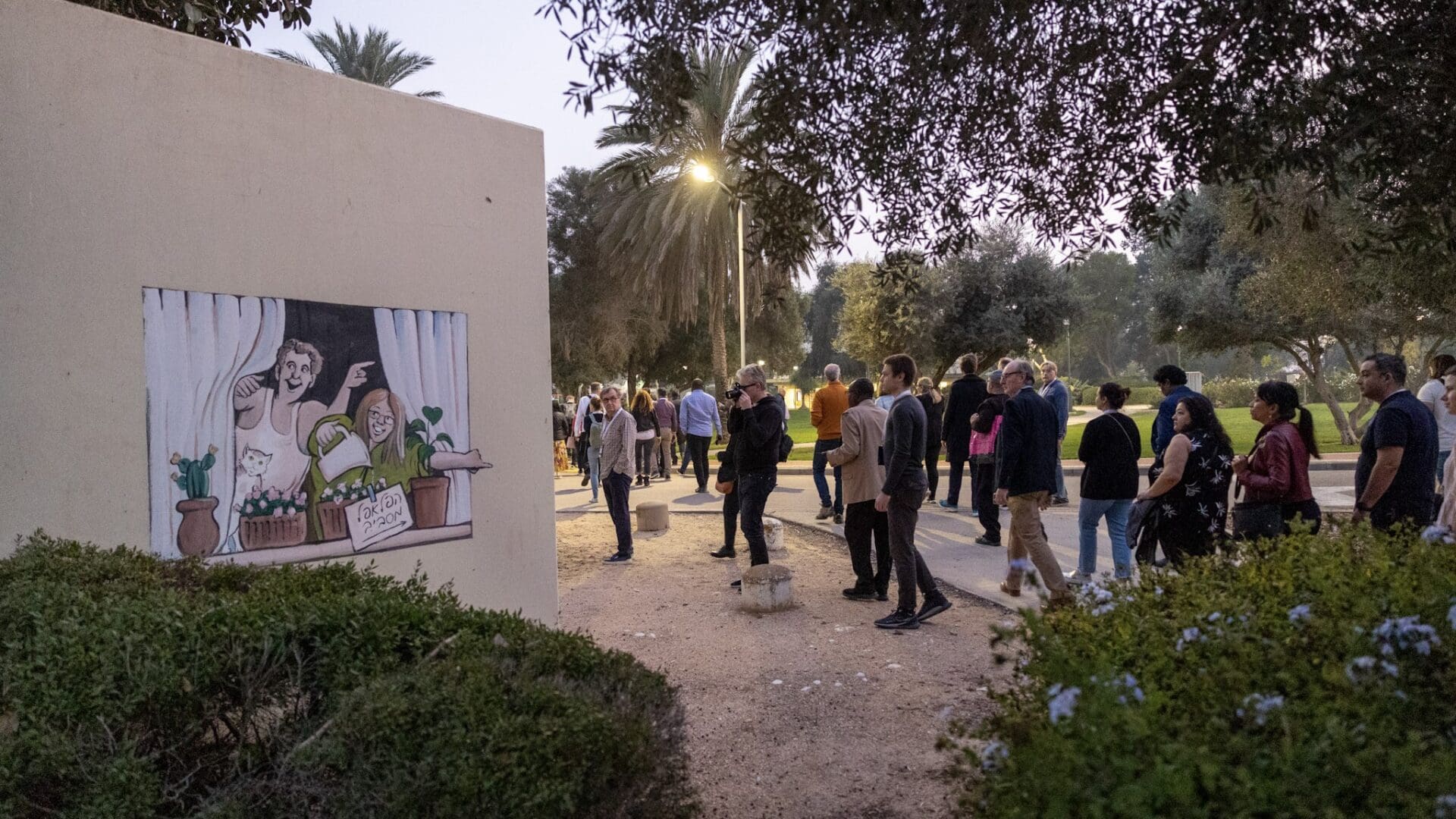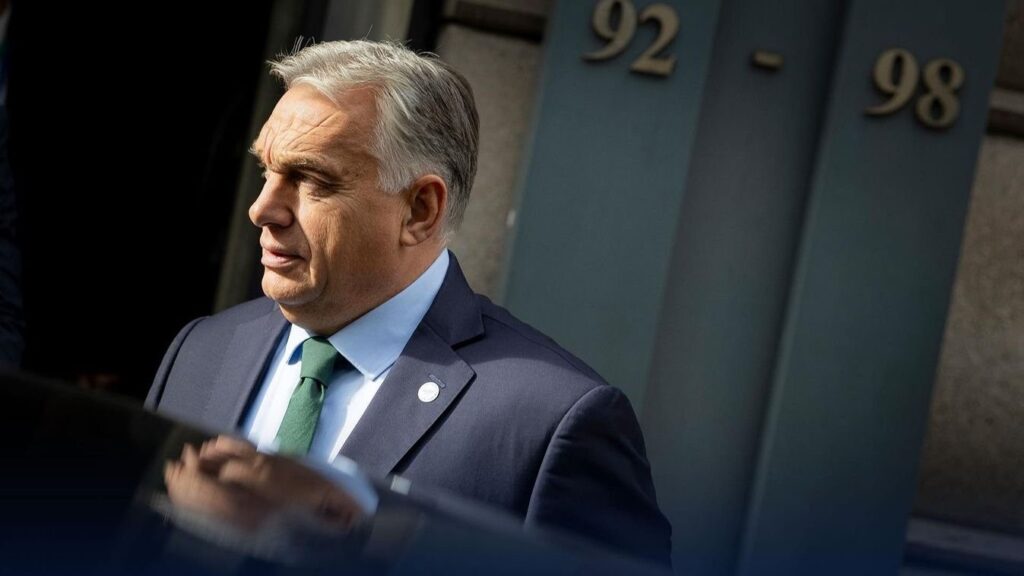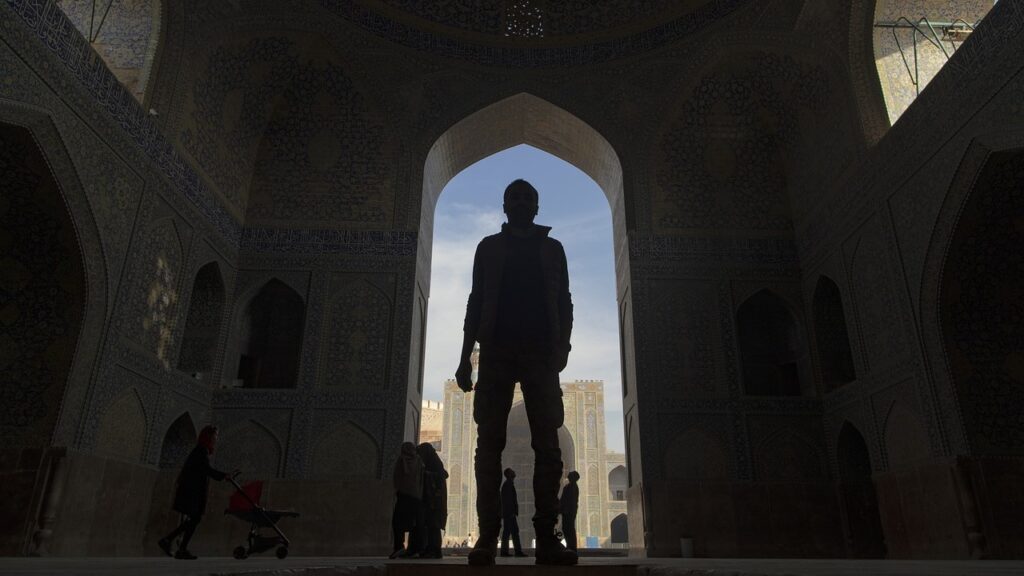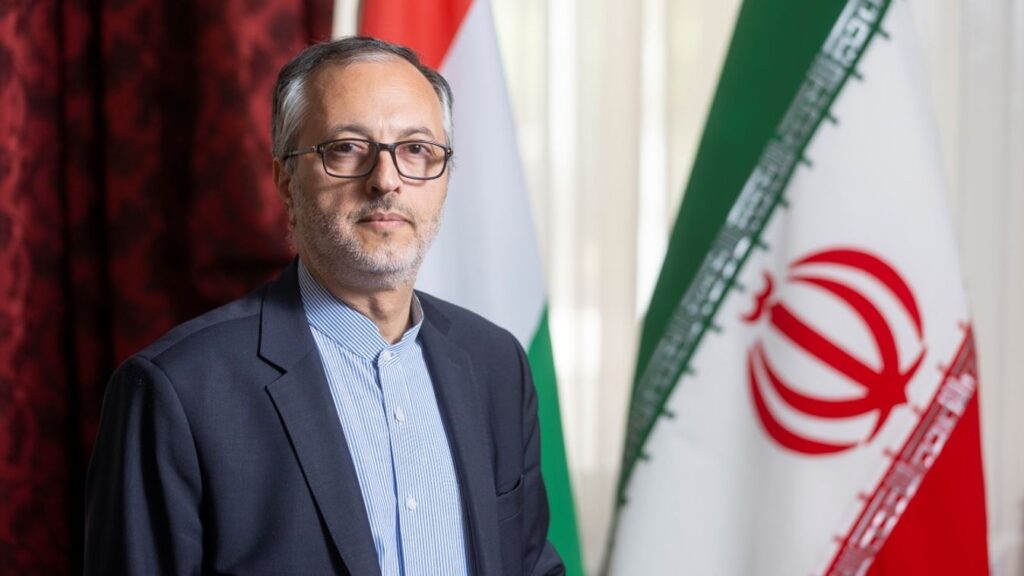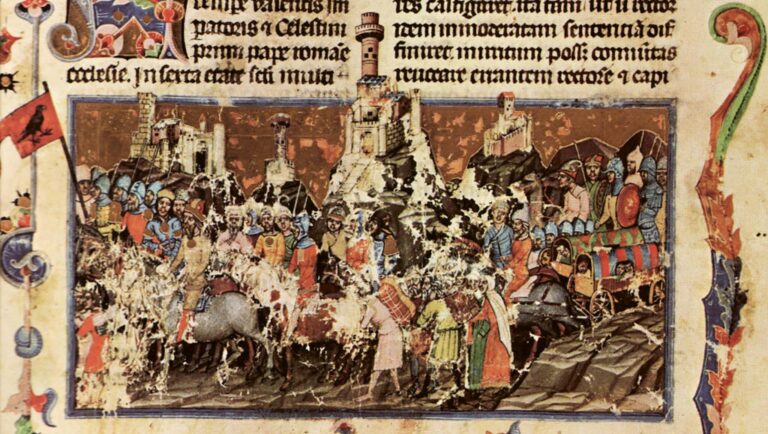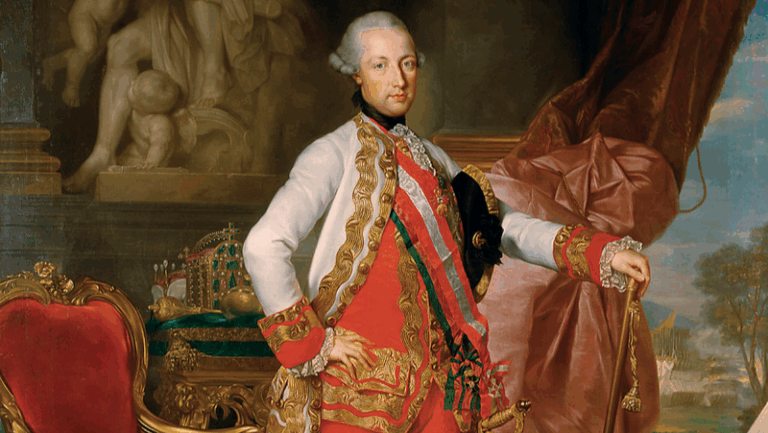The Israeli Government’s Press Office held its sixth Christian Media Summit from 11 to 14 December 2022. I had the opportunity to participate and represent Hungarian Conservative and the Danube Institute. In our first article on the event we wrote about the remarks and panel discussions of the first two days, quoting Israeli officials, media personalities, representatives of the Israeli Defence Forces, and pro-Israel NGOs.
On the third day of the Summit, we travelled to Southern Israel to visit an army base and see for ourselves how people live only two kilometres from the Gaza border. As we travelled through the Negev desert, we saw a landscape in bloom that looked nothing like an ordinary desert. The blooming Negev was a vision of Ben Gurion, Israel’s first prime minister who challenged scientists to turn the desert green and ‘reveal secrets of nature unique to our land’ that ultimately ‘determine the fate of the State of Israel and the standing of our people in the history of mankind.’ After Ben Gurion left the government, he spent his retired years in Sde Boker kibbutz in the Negev. [i] We also passed Neve Shalom village which is a unique model of coexistence, with more than 70 Palestinian Arab and Jewish families living together. The village was built in 1970 on the land of the Latrun Monastery by Fr. Bruno Hussar, whose intention was to create a place where the people of Israel would live together despite national and religious differences, and would conduct educational work for peace.[ii]
The Tzeelim army base called Urban Warfare Training Centre is also known as the ‘mini-Gaza’ training base as it looks eerily similar to the Hamas-controlled Gaza Strip.
The worldwide known Netflix series Fauda was also filmed at the mini-Gaza training base.
(Res.) Br. General Bentzi Gruber, Vice Commander (reserves) of Division 252, who had 20,000 soldiers under his command and fought in six wars, gave a lecture to the participants titled ‘Ethics in The Field’. The general stressed that soldiers must react very quickly to situation, often having about eight seconds to answer three fundamental questions before acting: ‘Is force used solely to accomplish the mission?’, ‘Is force used solely to target the enemy?’ and ‘Is the potential collateral damage proportional to the immediate threat?’ General Gruber emphasized that soldiers in the IDF can only use force if they don’t have the slightest doubt about whether the target is an enemy or a civilian. However, the General stressed that sometimes it’s really hard to identify whether someone is a terrorist or a civilian as terrorists often disguise themselves as ordinary civilians. As an example, he added that there were cases when terrorists used United Nations ambulances for deception to carry out an attack. General Gruber highlighted that terrorists always want to collateral damage to happen therefore when they carry out attacks, they ensure that innocent women, children, and civilians are there as human shields so it will be impossible for the IDF to avoid civilian casualties. Nevertheless, IDF soldiers can only use their firearms if the terrorist threat is immediate. According to the general, in terms of its strict ethical rules, US generals acknowledge that the Israeli defence forces are ‘25 years ahead of the US military.’
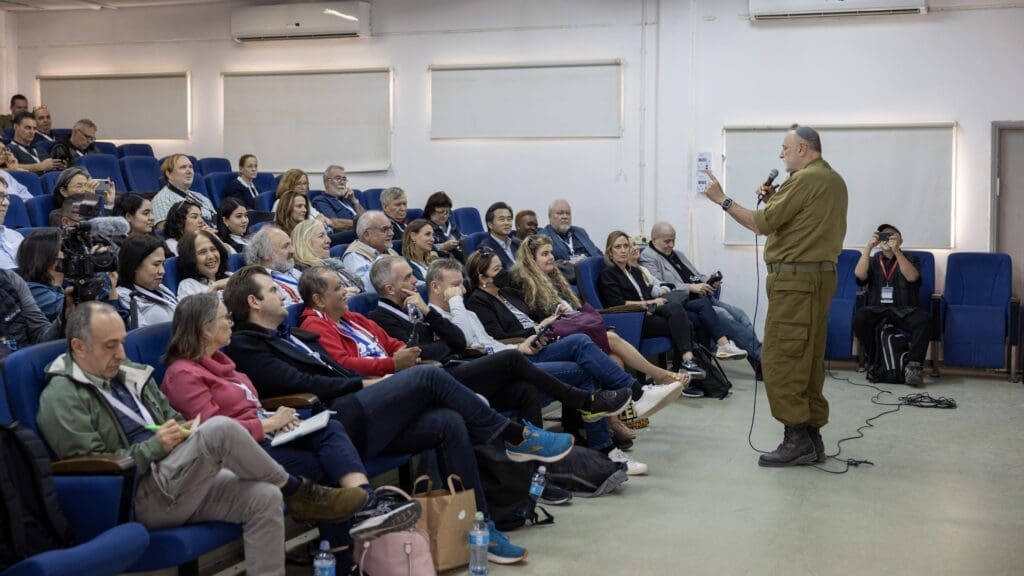
General Gruber has given more than a hundred lectures at several universities in the US and Europe, however, most of the time pro-Palestinian activists either tried to cancel his speech or interrupt him during his lectures. When he gave a speech at Brown University, for instance, he was ’greeted’ by a lecture hall full of leaflets portraying him as a ‘wanted’ person for ‘war crimes and crimes against humanity’. General Gruber concluded with a personal story about how her mother survived the Holocaust. His family was of Hungarian heritage and was almost completely wiped out in Auschwitz. His mother and her twin sister were tortured in Mengele’s twin experiments. After the cruel interventions, Gruber’s aunt became so weak that she wasn’t able to walk, therefore his mother had to carry her in a thin layer of clothing in the coldest winter weather through the 30 day- and 500 mile-long death march. Even though they survived the death camp and both eventually got married, Gruber’s aunt’s health was so impacted by the artocities survived that she did not survive giving birth to her daughter. So it was Gruber’s mother who raised her sister’s child. Gruber’s aunt now has 49 grandchildren.
At Kibbutz Nirim we learned that is was founded in 1946 and was established by the Hashomer Hatzair youth movement on Yom Kippur night. [iii] During the outbreak of the 1948 Arab-Israeli war, Kibbutz Nirim was the first Jewish settlement that was attacked by the Egyptian army and was almost destroyed. Seven Israeli soldiers were killed in the fighting. After the reconstruction of the village, a monument to the memory of those killed was built that incorporated two symbols of the battle: the Safety House and the sign reading ‘Not the tank will prevail, but the man’. Kibbutz Nirim is under the jurisdiction of the Eshkol Regional Council, with 31 other kibbutzim that are located in north-western Negev, bordering with the Gaza Strip.
Being just two kilometres away from the Gaza Strip is still a constant security threat for the residents of Nirim
as they live the closest to the hundreds or thousands of rockets that are launched almost every year from the Hamas-controlled strip. When residents hear the sound of a Red Alert, they have maximum ten seconds to get to a shelter. Adele Raemer has been a resident of Kibbutz Nirim for decades and has experienced all the escalations and operations related to Gaza since 2009. In her talk, she highlighted that although the constant danger they live in most residents still say that Kibbutz Nirim is ‘95 per cent heaven and only 5 per cent hell’. As we walked through the kibbutz it truly looked like a peaceful Mediterranean village with palm trees, green meadows, and blooming bushes. However, the shelters that are not just built in every house but next to playgrounds, kindergartens, and schools constantly reminded us of the ‘5 per cent hell’ the community has to live with. Keith Elan Isaacson, the head of security of the Eshkol Regional Council gave a security brief about the region. After a few years of silence, in April 2019 Gaza started to release incendiary balloons that caused more than 100 fires that in the Eshkol Regional Council alone destroyed 4,500 acres of farmland. As the livelihoods of the kibbutzim were founded primarily on agriculture, Hamas intentionally caused the fires as part of agro-terrorism. In May 2021, during the violent conflict, of the 4500 missiles fired on Israel more than 1450 rockets were directed at the Eshkol Region, while during Operation Breaking Dawn in August 2022, of the 1100 rockets 486 hit Eshkol. Isaacson also noted that over the years as many as 70 terrorist tunnels were detected in the region.
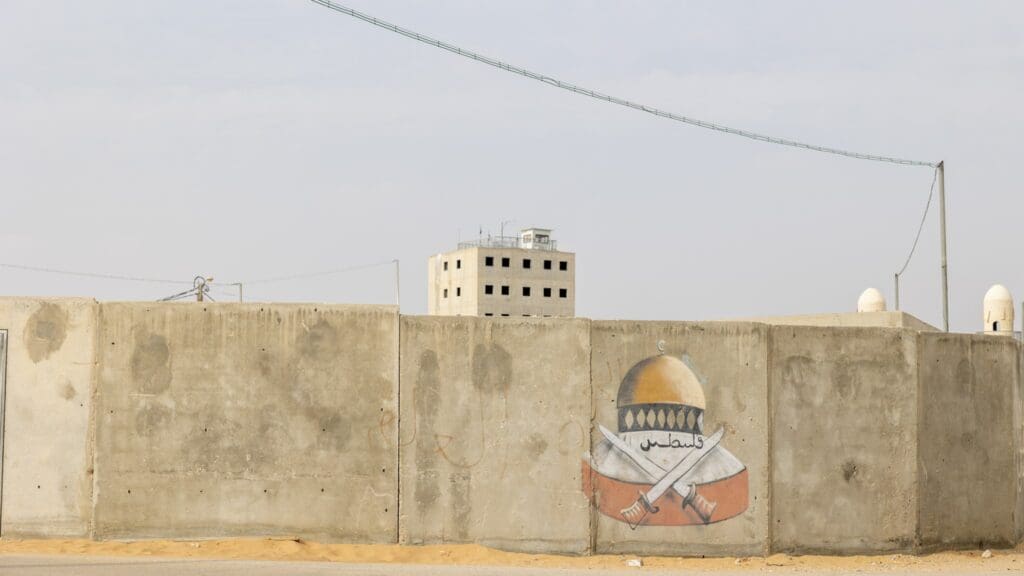
The eventful third day ended at Eshkol Regional Community Centre with the talks of Gadi Yarkoni, the mayor of Eshkol Regional Council, and a panel discussion with Michal Uziyahu, head of Eshkol Regional Council Resilience, Merav Vidal, the head of Eshkol Regional Council Resilience and Keith Elan Isaacson, head of security of the Eshkol Regional Council. Mayor Gadi Yarkoni was severely injured on 27 August in a mortar shell attack that struck an hour before a ceasefire with Hamas was set to take effect ending the war in Gaza. Mayor Yarkoni lost both his legs, while Ze’ev Etzion who was Kibbutz Nirim’s security coordinator, and his deputy, Shahar Melamed were killed in the attack. [iv] Despite the unthinkable trauma Mayor Yarkoni had to go through he started his speech by saying that for him living in Nirim is still ‘99 per cent heaven and only 1 per cent hell’.
The Eshkol Region has a lively community for its population of more than 14,500 people. At the community centre there is an elderly home, a gym and a coffee shop, and next to it there is a school to which 2,500 children go every day.
Mayor Yarkoni highlighted how thankful the community is for their Christian friends
and added that because of this support they feel they aren’t alone in the difficulties they have to face. Yarkoni concluded with the following thought: ‘We don’t hate Palestinians. We’re not even mad at them. We don’t want to win in the conflict, we just want to live.’
Michal Uziyahu spoke about the trauma children have to go through because they grow up in the reality of the terror of constant security tensions, sirens, and rockets. Because of the collective trauma generations have to grow up with, in 2007-2008 the Israeli government established resilience centres where civilians can receive free mental therapy from professionals. Merav Vidal, the head of Eshkol Regional Council Resilience added that the reason why the centre is called a resilience centre and not a trauma centre is because they focus on helping people to be resilient enough to process the emergency situations they may face again. Vidal highlighted that ‘while security works on securing the villages, the resilience centre is working on securing the sense of security.’ Keith Elan Isaacson added that until Gaza is controlled by Hamas and until the Palestinian people aren’t taught to love their neighbours, cooperation won’t be possible. When asked why do people still choose to live in the region despite the fragile security situation, the speakers said it is because it is their country and home, in good and bad times alike. ‘A year and a half ago one of the villages in the region was hit by 17 rockets that made huge holes in the ground. The next day the village ordered and planted 17 trees in the holes,’ Isaacson said to illustrate the determination of the locals to resist the terror. Michal Uziyahu thanked Christian leaders who help Israelis develop and secure their communities. As the Summit was just a few days before Hannukah, she concluded with the following thought: ‘Together we can create light and defeat darkness’.
On the last day of the Summit, we visited the City of David archaeological site that reveals the ancient birthplace of Jerusalem. The City of David is located southeast of the Old City, on Ophel Hill near the Western Wall which is now under the Arab village of Silwan. The archaeological site was rediscovered 150 years ago and was excavated a few decades ago. It became the most important biblical site that is located exactly where King David’s palace used to stand and has significant pieces of evidence of King David’s kingship over Jerusalem. The tour guide showed the participants the Pilgrim’s Road where millions of Jewish pilgrims used to walk as they ascended the Temple Mount. The site is a very recent archaeological discovery that has not yet been open to the public.
According to archaeologists, it is certain that Jesus himself had walked the Pilgrim’s Road as well.
The 2,700-year-old Pool of Siloam also sits at the lower foot of the Pilgrim’s Road and marks the location where millions would participate in a ritual purification before ascending to the Temple Mound half a mile away. [v] It’s been announced that the fully excavated Pool of Siloam, where according to the Bible, Jesus healed a blind man, will become accessible in the near future.[vi]
As the closing programme of the Summit, we visited the Knesset, the unicameral legislature of Israel. Beside other parliamentary representatives, Itamar Ben-Gvir, Israel’s minister of national security also gave a speech. Ben-Gvir highlighted that his goal is to protect all the people of Israel, Jews and Arabs, religious, and non-religious, by fighting against terror and not surrendering to it. He stressed that it isn’t true that he thinks every Arab is a terrorist, as he wants to protect from terrorism those Arabs who would like to live in peaceful coexistence with the Jewish population of Israel. In response to a question, Ben-Gvir admitted that when he was 17 years old, he did believe the narrative that Israel should kick out every Arab of the country because every Arab is a terrorist, but his thinking has changed since.
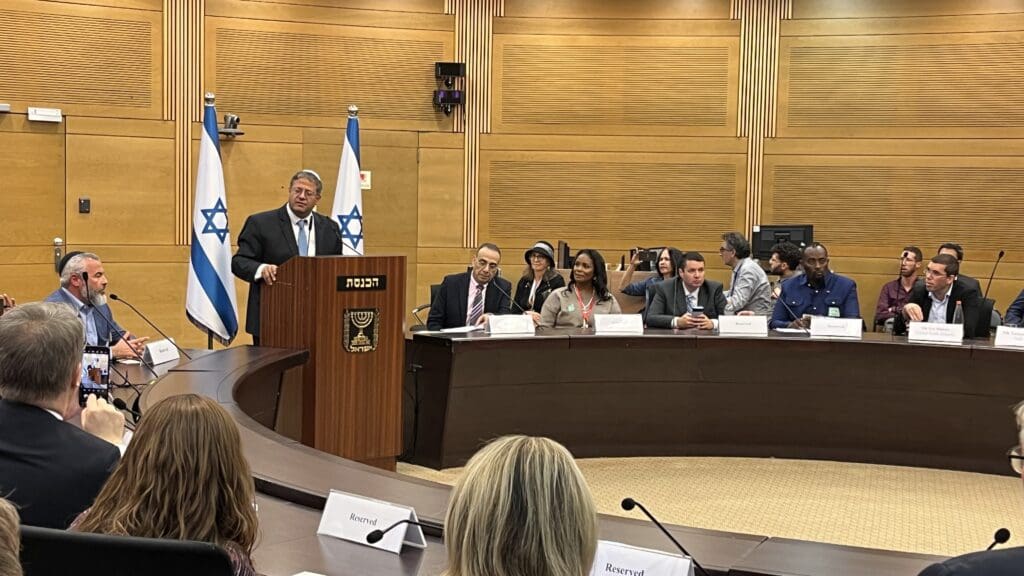
Josh Reinstein, the director of the Knesset Christian Allies Caucus emphasised that ‘faith-based diplomacy in which Christians take their biblical support for Israel and turn it into real political action is the most important weapon Israel has in the diplomatic arena.’ Ohad Tal, a member of the Religious Zionist Party, highlighted that the ‘greatest struggle today is the movements that seek to wipe out the foundations of our identity, family values, religious and national fundamentals.’ He added that Christians and Jews should not be silent about that since ‘both Judaism and Christianity are the religions that gave birth to Western civilisation.’
In most cases, the media reports on Israel when there is a violent conflict, so many assume that visiting the country is dangerous and people who live in the country are living in constant fear. However, during the four-day summit where we caught a glimpse of Israel’s political, security, economic and social landscape, we experienced a completely different reality. People who live here love their lives and are thankful every day for their homeland. However, because they have neighbours who want to destroy their country, they have to live their lives fully aware of the fact that there is a possible security threat each day, and that they have to defend their land.
On 26 January, one day before International Holocaust Remembrance Day sirens sounded throughout the southern coastal city of Ashkelon, as well as in its industrial zone, and the nearby Israeli settlements of Zikim and Karmia, as the terrorist fired at least three rockets from Gaza to Israel. One of the rockets was intercepted by the Iron Dome air defence system, another landed in an open field and a third did not reach the border.[vii] On 27 January, the day when people across the globe remembered one of the worst atrocities in human history, seven people were shot and killed and several more wounded in a terror shooting attack at a synagogue in Jerusalem’s Neve Yaakov neighbourhood.[viii] As Jewish people were reliving the pain of losing their loved ones as a result of antisemitism, Palestinian groups fired off fireworks and celebrated the terror attack.[ix] On 28 January, a 13-year-old Palestinian terrorist from East Jerusalem shot and wounded an Israeli father and son at the City of David site. [x]
In his Holocaust remembrance speech, Benjamin Netanyahu, Israel’s prime minister stated that now that the Jewish people have the state of Israel, they can and will protect themselves, and will not allow its enemies to inflict the very pain, suffering, and devastating loss Jewish people experienced during the Holocaust, and will never allow the Holocaust to happen again.[xi]
[i] The Israel Forever Foundation, ‘Israel’s Negev: a desert in bloom’, The Israel Forever Foundation, https://israelforever.org/interact/blog/israels_negev_desert_bloom/ , accessed 24 January 2023.
[ii] Neve Shalom, ‘Community’, Neve Shalom, https://wasns.org/-community- , accessed 24 January 2023.
[iii]Nirim, ‘About Nirim’, Nirim Community, http://www.nirim.co.il/viewStaticPage.aspx?pageID=31, accessed 24 January 2023.
[iv] Gedaliyah Reback, ‘Southern man who lost legs in mortar attack elected mayor’, Times of Israel, (3 June 2015), https://www.timesofisrael.com/southern-man-elected-mayor-after-losing-legs-in-mortar-attack/ , accessed 25 January 2023.
[v] Jonathan Feldstein, ‘What’s new in the ancient City of David?’, All Israel News, ( 9 January 2023), https://allisrael.com/what-s-new-in-the-ancient-city-of-david , accessed 25 January 2023.
[vi]Georgia Barnett, ‘Jerusalem’s ancient Pool of Siloam to be opened to public’, Israel 21c, (17 January 2023), https://www.israel21c.org/jerusalems-ancient-pool-of-siloam-to-be-opened-to-public/ , accessed 25 January 2023.
[vii] Emanuel Fabian, ‘Gazans fire rockets at south as Israeli jets hit Strip in retaliatory strike’, The Times of Israel, (27 January 2023), https://www.timesofisrael.com/fresh-rocket-alarms-blare-as-israeli-jets-bomb-gaza-in-retaliatory-strike/ , accessed 27 January 2023.
[viii] Emanuel Fabian, ‘Palestinian terrorist shoots 7 dead in ‘murderous rampage’ at Jerusalem synagogue’, The Times of Israel, (27 January 2023), https://www.timesofisrael.com/five-wounded-in-suspected-shooting-attack-in-jerusalem-assailant-shot/ , accessed 27 January 2023.
[ix] Visegrád 24, Twitter, (27 January 2023), https://mobile.twitter.com/visegrad24/status/1619056062426120194 , accessed 27 January 2023.
[x] Emanuel Fabian, ‘Two seriously hurt in 2nd Jerusalem terror shooting; 13-year-old attacker shot’, The Times of Israel, (28 January 2023) https://www.timesofisrael.com/2-seriously-wounded-in-another-shooting-attack-in-jerusalem-attacker-neutralized/ , accessed 28 January 2023.
[xi] Ministry of Foreign Affairs, ‘PM Netanyahu on International Holocaust Remembrance Day’, Gov.il, (27 January 2023), https://www.gov.il/en/departments/news/pm-netanyahu-on-international-holocaust-remembrance-day-27-jan-2023 , accessed 27 January 2023.

